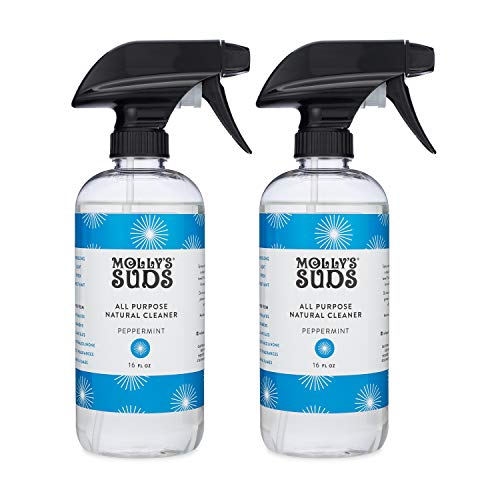
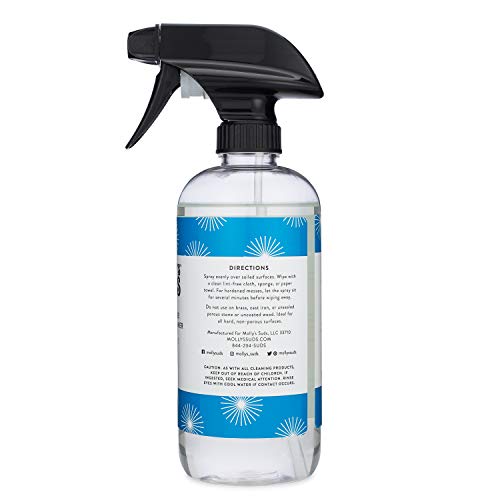
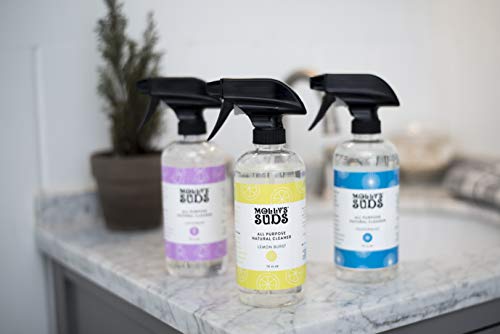
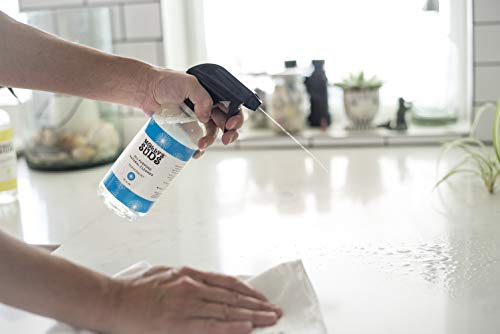
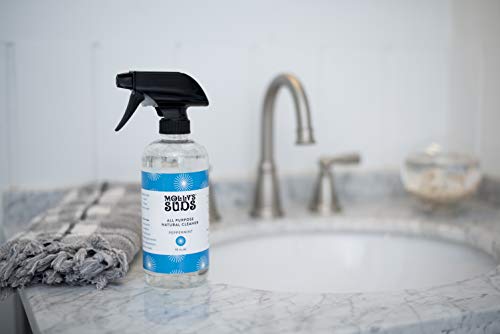
Molly's Suds All Purpose Cleaner - Deep Cleaning Power, Plant-Based Ingredients - Peppermint, 32oz


Citric Acid
Medium RiskCitric acid is an alpha hydroxy acid used in personal care products primarily for its role as a pH adjuster and natural preservative. It occurs naturally in citrus fruits and is commonly utilized in various formulations for its chelating properties and mild exfoliation benefits.
Sustai Insights
Citric acid offers functional benefits as an effective preservative and pH stabilizer, contributing to product longevity and stability. It is biodegradable and derived from renewable sources. Health risks are low, with minimal concerns regarding carcinogenicity, allergies, and reproductive toxicity. However, moderate use restrictions exist due to potential irritation at high concentrations. Environmental risks are limited, as citric acid is not known to accumulate in ecosystems. Regulatory agencies have no significant advisories against its use. Overall, it is assessed as a medium-risk ingredient, with safe usage practices recommended and alternatives available.
Potassium Sorbate
Medium RiskPotassium sorbate is a potassium salt of sorbic acid, primarily used as a preservative in food and cosmetic products. It inhibits the growth of molds, yeast, and some bacteria, extending the shelf life of products. It is commonly found in various formulations due to its effectiveness and low toxicity.
Sustai Insights
Potassium sorbate serves as an effective preservative, preventing microbial growth in food and cosmetic products, which is vital for safety and longevity. Although it has a low risk of carcinogenicity and developmental toxicity, there is a moderate concern regarding allergies and immunotoxicity. Environmentally, it poses minimal risks as it is not significantly bioaccumulative. Regulatory agencies have verified its use, although some products may face restrictions. Overall, it is assessed as a medium risk ingredient, with safe usage practices recommended, and alternatives such as natural preservatives could be considered.
Sodium Benzoate
Medium RiskSodium benzoate is a preservative commonly used in food and cosmetic products to prevent microbial growth and extend shelf life. It is derived from benzoic acid and is effective at low concentrations, often used in acidic environments like beverages and condiments.
Sustai Insights
Sodium benzoate serves effectively as a preservative, contributing to product stability and safety. It is generally recognized as safe with low concerns for carcinogenicity, allergies, and reproductive toxicity, though it faces moderate use restrictions in some regions. Environmental risks include its potential as a pollutant, but it does not bioaccumulate significantly. Regulatory bodies have issued advisories regarding its concentration in products. Overall, the risk level is assessed as medium, with safe usage practices recommended. Alternatives such as potassium sorbate may provide similar benefits with potentially lower restrictions.
Sodium Citrate
Low RiskSodium citrate is used in cosmetic formulations primarily as a buffering agent, helping to stabilize pH levels. It is derived from citric acid and is commonly found in various personal care products to enhance their efficacy and stability.
Sustai Insights
Sodium citrate offers functional benefits such as effective pH regulation and acts as a mild preservative. It is generally recognized as safe with low risks for cancer, allergies, and reproductive toxicity. Environmental concerns are minimal, with no significant pollutant potential or bioaccumulation. Regulatory bodies like the FDA and COSMOS have no major restrictions on its use. Overall, sodium citrate presents a low risk, making it a viable ingredient in cosmetic formulations. Safe usage practices should be followed, and alternatives are not typically necessary.
Isopropylideneglycerol
Low RiskIsopropylideneglycerol is a chemical compound primarily used as a moisturizing agent in cosmetic and personal care products. It functions by attracting moisture to the skin, thereby enhancing hydration and improving product texture.
Sustai Insights
Isopropylideneglycerol serves as an effective humectant, providing moisture retention and enhancing the sensory profile of formulations. It is considered low risk in terms of health concerns, with minimal evidence linking it to carcinogenicity, allergenic reactions, or reproductive toxicity. Environmentally, it poses low risks as it is not a known pollutant or bioaccumulative substance. Regulatory bodies, including Environment Canada, have not issued significant warnings. Overall, it is regarded as a low-risk ingredient, with no major safety concerns, making it a suitable choice for various applications.
Coco Glucoside
Low RiskCoco-glucoside is a synthetic surfactant produced from coconut oil and glucose. It serves primarily as a cleansing and emulsifying agent in personal care products, helping to create lather and improve the texture of formulations.
Sustai Insights
Coco-glucoside offers effective cleansing properties and is biodegradable, making it a more sustainable option in formulations. Health risks are generally low, with minimal concerns regarding irritation and allergies. Environmental hazards are also low, as it does not bioaccumulate. Regulatory bodies do not impose significant restrictions. Safe usage practices should be followed, and alternatives may include other mild surfactants. Overall, the risk level associated with coco-glucoside is low.
Gluconolactone
Low RiskGluconolactone is a lactone that functions primarily as a humectant and exfoliant in cosmetic products. It is derived from gluconic acid and is used to improve skin hydration and texture. This ingredient is known for its compatibility with various skin types and its ability to enhance product stability.
Sustai Insights
Gluconolactone offers functional benefits as an effective humectant, promoting skin hydration and serving as a gentle exfoliant. It is biodegradable and has low allergenic potential. Health risks are minimal, with low concerns for carcinogenicity, immunotoxicity, and reproductive toxicity. Environmental risks are also low, with no known pollutant or bioaccumulative effects. Regulatory bodies, including the FDA, have not imposed restrictions on its use. Overall, the risk level associated with gluconolactone is low, making it a safe choice in cosmetic formulations.
Sodium Citrate
Low RiskSodium citrate is used in cosmetic formulations primarily as a buffering agent, helping to stabilize pH levels. It is derived from citric acid and is commonly found in various personal care products to enhance their efficacy and stability.
Sustai Insights
Sodium citrate offers functional benefits such as effective pH regulation and acts as a mild preservative. It is generally recognized as safe with low risks for cancer, allergies, and reproductive toxicity. Environmental concerns are minimal, with no significant pollutant potential or bioaccumulation. Regulatory bodies like the FDA and COSMOS have no major restrictions on its use. Overall, sodium citrate presents a low risk, making it a viable ingredient in cosmetic formulations. Safe usage practices should be followed, and alternatives are not typically necessary.
Isopropylideneglycerol
Low RiskIsopropylideneglycerol is a chemical compound primarily used as a moisturizing agent in cosmetic and personal care products. It functions by attracting moisture to the skin, thereby enhancing hydration and improving product texture.
Sustai Insights
Isopropylideneglycerol serves as an effective humectant, providing moisture retention and enhancing the sensory profile of formulations. It is considered low risk in terms of health concerns, with minimal evidence linking it to carcinogenicity, allergenic reactions, or reproductive toxicity. Environmentally, it poses low risks as it is not a known pollutant or bioaccumulative substance. Regulatory bodies, including Environment Canada, have not issued significant warnings. Overall, it is regarded as a low-risk ingredient, with no major safety concerns, making it a suitable choice for various applications.
Coco Glucoside
Low RiskCoco-glucoside is a synthetic surfactant produced from coconut oil and glucose. It serves primarily as a cleansing and emulsifying agent in personal care products, helping to create lather and improve the texture of formulations.
Sustai Insights
Coco-glucoside offers effective cleansing properties and is biodegradable, making it a more sustainable option in formulations. Health risks are generally low, with minimal concerns regarding irritation and allergies. Environmental hazards are also low, as it does not bioaccumulate. Regulatory bodies do not impose significant restrictions. Safe usage practices should be followed, and alternatives may include other mild surfactants. Overall, the risk level associated with coco-glucoside is low.
Gluconolactone
Low RiskGluconolactone is a lactone that functions primarily as a humectant and exfoliant in cosmetic products. It is derived from gluconic acid and is used to improve skin hydration and texture. This ingredient is known for its compatibility with various skin types and its ability to enhance product stability.
Sustai Insights
Gluconolactone offers functional benefits as an effective humectant, promoting skin hydration and serving as a gentle exfoliant. It is biodegradable and has low allergenic potential. Health risks are minimal, with low concerns for carcinogenicity, immunotoxicity, and reproductive toxicity. Environmental risks are also low, with no known pollutant or bioaccumulative effects. Regulatory bodies, including the FDA, have not imposed restrictions on its use. Overall, the risk level associated with gluconolactone is low, making it a safe choice in cosmetic formulations.
Citric Acid
Medium RiskCitric acid is an alpha hydroxy acid used in personal care products primarily for its role as a pH adjuster and natural preservative. It occurs naturally in citrus fruits and is commonly utilized in various formulations for its chelating properties and mild exfoliation benefits.
Sustai Insights
Citric acid offers functional benefits as an effective preservative and pH stabilizer, contributing to product longevity and stability. It is biodegradable and derived from renewable sources. Health risks are low, with minimal concerns regarding carcinogenicity, allergies, and reproductive toxicity. However, moderate use restrictions exist due to potential irritation at high concentrations. Environmental risks are limited, as citric acid is not known to accumulate in ecosystems. Regulatory agencies have no significant advisories against its use. Overall, it is assessed as a medium-risk ingredient, with safe usage practices recommended and alternatives available.
Potassium Sorbate
Medium RiskPotassium sorbate is a potassium salt of sorbic acid, primarily used as a preservative in food and cosmetic products. It inhibits the growth of molds, yeast, and some bacteria, extending the shelf life of products. It is commonly found in various formulations due to its effectiveness and low toxicity.
Sustai Insights
Potassium sorbate serves as an effective preservative, preventing microbial growth in food and cosmetic products, which is vital for safety and longevity. Although it has a low risk of carcinogenicity and developmental toxicity, there is a moderate concern regarding allergies and immunotoxicity. Environmentally, it poses minimal risks as it is not significantly bioaccumulative. Regulatory agencies have verified its use, although some products may face restrictions. Overall, it is assessed as a medium risk ingredient, with safe usage practices recommended, and alternatives such as natural preservatives could be considered.
Sodium Benzoate
Medium RiskSodium benzoate is a preservative commonly used in food and cosmetic products to prevent microbial growth and extend shelf life. It is derived from benzoic acid and is effective at low concentrations, often used in acidic environments like beverages and condiments.
Sustai Insights
Sodium benzoate serves effectively as a preservative, contributing to product stability and safety. It is generally recognized as safe with low concerns for carcinogenicity, allergies, and reproductive toxicity, though it faces moderate use restrictions in some regions. Environmental risks include its potential as a pollutant, but it does not bioaccumulate significantly. Regulatory bodies have issued advisories regarding its concentration in products. Overall, the risk level is assessed as medium, with safe usage practices recommended. Alternatives such as potassium sorbate may provide similar benefits with potentially lower restrictions.
Experience the power of nature with Molly's Suds Natural All Purpose Cleaner, a plant-powered solution designed for eco-conscious cleaning. This multi-surface cleaner provides a deep clean without harmful chemicals, making it ideal for every home.
- Deep Clean, Streak-Free Shine, Multi-Surface Use: Easily cuts through grease and grime on countertops, showers, and floors, leaving surfaces sparkling clean and residue-free.
- Safer Ingredients, Eco-Friendly Formula: Made from bio-based, plant-powered ingredients, this cleaner is free of synthetic fragrances, dyes, and harsh chemicals, perfect for those with sensitivities.
- Versatile Cleaning, Multiple Surfaces: Suitable for all sealed, hard surfaces including glass, stainless steel, and granite, ensuring a thorough clean throughout your home.
- Refreshing Peppermint Scent: Infused with a light peppermint aroma, it not only cleans but also neutralizes odors, leaving your space feeling fresh and invigorated.
- Responsible Packaging, Ethical Standards: Comes in recyclable packaging and is certified cruelty-free, aligning with sustainable practices to protect the planet and its inhabitants.
Subscribe & Save with Sustai
- Best Price Guarantee: Always enjoy the lowest prices on sustainable home essentials.
- No Surprises: We’ll notify you before shipping. No hidden fees, ever.
- You’re in Charge: Change, pause, or cancel your subscription anytime with ease.
- Eco-Friendly Deliveries: Our grouped shipments mean less packaging and lower emissions.
Join us on a sustainable journey. Special offers for a limited time! Prices and promotions may change.
Recommended Products
Experience the power of nature with Molly's Suds Natural All Purpose Cleaner, a plant-powered solution designed for eco-conscious cleaning. This multi-surface cleaner provides a deep clean without harmful chemicals, making it ideal for every home.
- Deep Clean, Streak-Free Shine, Multi-Surface Use: Easily cuts through grease and grime on countertops, showers, and floors, leaving surfaces sparkling clean and residue-free.
- Safer Ingredients, Eco-Friendly Formula: Made from bio-based, plant-powered ingredients, this cleaner is free of synthetic fragrances, dyes, and harsh chemicals, perfect for those with sensitivities.
- Versatile Cleaning, Multiple Surfaces: Suitable for all sealed, hard surfaces including glass, stainless steel, and granite, ensuring a thorough clean throughout your home.
- Refreshing Peppermint Scent: Infused with a light peppermint aroma, it not only cleans but also neutralizes odors, leaving your space feeling fresh and invigorated.
- Responsible Packaging, Ethical Standards: Comes in recyclable packaging and is certified cruelty-free, aligning with sustainable practices to protect the planet and its inhabitants.

You can have at most 2 Sustainable Steals products in your cart
Customer Reviews
Customers’ View
Customers appreciate the effectiveness and eco-friendly nature of this all-purpose cleaner. Many users highlight the pleasant peppermint scent, noting that it smells fresh and clean without harsh chemicals. They commend its ability to tackle tough messes, stating, 'It works so well and smells so good.' Additionally, the product's non-toxic ingredients make users feel safe for their families, with comments like, 'I love this clean cleaner.' However, some customers reported issues with leakage upon arrival and a slight stickiness left on surfaces after cleaning. Overall, the product aligns well with sustainable values, making it a suitable choice for health-conscious consumers.
AI-generated from the text of customer reviewsThis product has no reviews yet.




